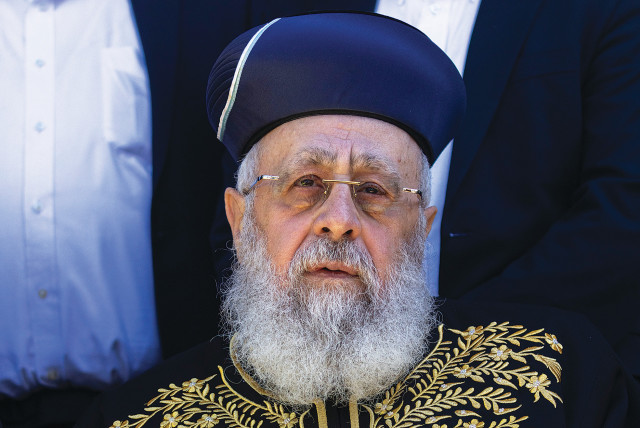Religious tolerance begins with religious leadership - opinion

Imagine if the roles were reversed, with Christians spitting at Jews in some European capital.
In 2012, the hit news show 60 Minutes ran a report claiming that Israel’s presence in the West Bank was leading to a sharp decline in the population of Palestinian Christian communities.
This report is most notably remembered for the on-air confrontation between the late CBS correspondent Bob Simon and Israel’s ambassador to the US at the time, Michael Oren, who had contacted the network’s president to voice his concerns about the story even before it was broadcast.
Oren pushed back and explained to Simon that it was his job to ensure that accurate information was shared with the American public and that the focus on Israel was “completely incomprehensible” at a time when Christian communities throughout the Middle East were facing oppression and violence, with churches being burned and a significant historical chapter unfolding.
Oren was making the point that while Israeli operations in the West Bank may have been inconvenient, they were essential for Israeli survival.
In the years since that report, the consensus has largely shifted. The world now acknowledges that the dwindling Christian population in the West Bank and their nearly non-existent presence in Gaza can be attributed more to Palestinian fundamentalism and discrimination than to Israel.
The spitting incident
However, a recent video has cast a shadow over this perspective within Israel itself.
In a widely circulated video, a group of ultra-Orthodox men, some of them wearing a tallit (prayer shawl) and carrying their lulav (palm branch) and etrog (citron), are seen spitting at a procession of Christian pilgrims carrying a large wooden cross through the Old City. It’s worth noting that while Jews celebrated Sukkot during that week, thousands of Christians descended upon Israel’s capital city for the Feast of Tabernacles.
It was reassuring to witness Israeli leaders unequivocally condemning this incident. Prime Minister Benjamin Netanyahu said that “we will show zero tolerance against those who harm worshipers;” Foreign Minister Eli Cohen said that “this phenomenon does not represent the values of Judaism;” and Ashkenazi Chief Rabbi David Lau stressed that “such unacceptable behaviors should not be associated with Jewish religious law in any way.”
However, despite this widespread condemnation, the incident captured on film was not an isolated occurrence. In recent months, Jewish extremists have targeted Christian sites, tourists, and clergy with alarming impunity, and been met with barely a whisper of objection. These incidents include vandalism at historical Christian sites, confrontations with Christian pilgrims, and disrespectful behavior toward Christian clergy and worshipers.
In July, a Jewish man threw a rock through an Ottoman-era window in the Christian Cenacle, known as the Room of the Last Supper; Breslov Hassidim have been visiting the Carmelite Stella Maris Monastery in Haifa, sometimes, it seems, with members of the La Familia racist group; earlier this year, the Maronite Christian center in Ma’alot-Tarshiha in northern Israel was vandalized while graves in the Christian cemetery on Mount Zion were damaged and hateful inscriptions were sprayed on the walls of the Armenian monastery in Jerusalem’s Old City.
There was the incident when an usher at the Western Wall plaza asked the abbot of the Dormition Abbey in Jerusalem, Nikodemus Schnabel, to remove the large cross he wore over his black robe because it was “really big and inappropriate” for this “Jewish place” and there was the group of religious Jews – led by Rabbi Zvi Thau of Har Hamor Yeshiva and Jerusalem city councilman Aryeh King – who accosted a group of Christian pilgrims at the Davidson Center near the Kotel.
In recent months, Christian groups recorded dozens of discriminatory acts against pilgrims and worshipers countrywide, prompting one group to convene a conference titled “Why Do (Some) Jews Spit on Gentiles?”
And what did the Israeli government do when it learned of the conference? Regrettably, the Foreign Ministry chose to boycott it, refusing to send a representative, despite being officially responsible for interfaith relations.
Furthermore, an official who tweeted condemnation of some of the spitting incidents was reportedly ordered to delete the tweet by the minister’s office, which did not want to upset the religious members of the coalition.
The only reason the recent spitting incident garnered attention was due to the presence of a video capturing it. Had there been no video evidence, the abuse suffered by shocked and insulted Christian tourists would likely have gone unaddressed.
This pattern cannot persist. While these incidents are carried out by a small fringe extreme, they tarnish the reputation of all Israelis. Although it is reassuring to see some perpetrators detained by police, this action should have been taken when the first case was reported by Christian clergy, not just in response to a video. Israel cannot claim to be a place where all religions are welcome while failing to act promptly upon the first complaint.
Imagine if the roles were reversed, with Christians spitting at Jews in some European capital. Israeli politicians would swiftly denounce growing antisemitism in Europe, the Foreign Ministry would summon the European country’s ambassador, and the immigration minister would call for an emergency plan to encourage immigration from that country.
But we also have to recognize where this comes from.
There is a lack of religious leadership in this country today. While Lau put out a statement after the incident, his partner at the helm of the Rabbinate, Sephardi Chief Rabbi Yitzhak Yosef, was busy insulting more than half of Israel, declaring that when a person eats non-kosher food “his brain becomes stupid” and “he can’t understand things.”
He went on to call secular Israelis “pitiable” and said that those he meets in the rabbinical courts are people who “do not find fulfillment in life.”
With a chief rabbi like this who teaches Jews to be intolerant toward other Jews, how can we expect Jews to then treat members of other faiths respectably? Just look at what happened on Yom Kippur when Jews fought with other Jews over the way to pray.
The Chief Rabbinate has long been a disappointment, granting status and budgets to rabbis like Yitzchak Yosef and Reform Judaism basher Shlomo Amar before him, who do more to divide the Jewish people than unite it.
There is no justification for the continued existence of the Chief Rabbinate, and the recent events serve as further evidence. To foster tolerance, respect, and unity, Israelis need religious role models who practice and preach these values. Unfortunately, this is not the reality today.
The writer is a senior fellow at the Jewish People Policy Institute and the immediate past editor-in-chief of The Jerusalem Post.
Jerusalem Post Store
`; document.getElementById("linkPremium").innerHTML = cont; var divWithLink = document.getElementById("premium-link"); if (divWithLink !== null && divWithLink !== 'undefined') { divWithLink.style.border = "solid 1px #cb0f3e"; divWithLink.style.textAlign = "center"; divWithLink.style.marginBottom = "15px"; divWithLink.style.marginTop = "15px"; divWithLink.style.width = "100%"; divWithLink.style.backgroundColor = "#122952"; divWithLink.style.color = "#ffffff"; divWithLink.style.lineHeight = "1.5"; } } (function (v, i) { });

